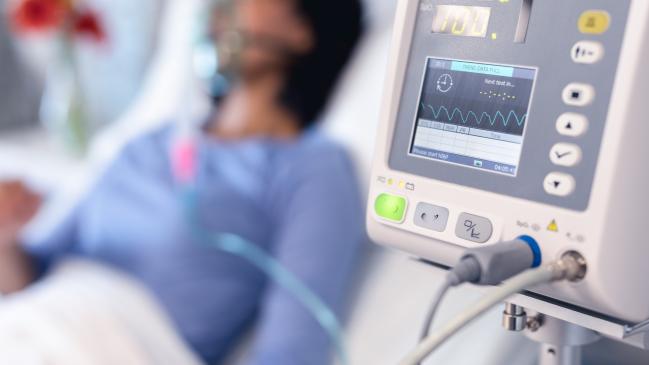Drugs to Tweak RAAS Response No Help in Acute COVID-19, RCTs Show
A total of three trials explored whether starting ACE inhibitors, ARBs, or novel agents could improve outcomes for patients.

Treatments that target the renin-angiotensin-aldosterone system (RAAS) don’t improve outcomes in adult patients hospitalized with acute COVID-19. Three separate trials of different RAAS-related strategies, published last week in JAMA, arrived at that same conclusion.
A trial from the REMAP-CAP investigators, based on the theory that overactivation of the RAAS pathway could lead to worse COVID-19 outcomes, tested use of an ACE inhibitor or ARB against no RAAS inhibition. Researchers from the ACTIV-4 Host Tissue platform tried a different tactic, running two trials of investigational agents intended to address imbalances in angiotensin (1-7) and angiotensin II resulting from RAAS dysregulation, TXA-127 and TRV-027, each compared against placebo.
All three of the studies were stopped early, the REMAP-CAP trial for safety concerns and the ACTIV-4 Host Tissue trials due to low probability of efficacy. They join the earlier CLARITY trial, published last year in the BMJ, showing no benefit to RAAS inhibition in COVID-19.
Behind this interest in RAAS is the knowledge that one of its key components is angiotensin-converting enzyme 2 (ACE2) and that binding with the ACE2 receptor is “how the virus gains entry into all human cells,” REMAP-CAP investigator Patrick R. Lawler, MD, MPH (Toronto General Hospital, Canada), told TCTMD. This viral binding might lead to a rise in ACE2, “because the body’s typical reaction to having something blocked is just to upregulate its own version of it,” he explained. With even more ACE2 available, there would be “more opportunities for the virus to enter cells.”
Thus, early in the COVID-19 pandemic, there was speculation that patients taking RAAS inhibitors on a long-term basis for diseases like heart failure, hypertension, and diabetes might see worse a worse prognosis than those not taking the medications.
Notably, though, both US and European heart societies urged that RAAS-inhibitor regimens shouldn’t be altered. Soon new data began to roll in with reassurance that the drugs themselves probably weren’t leading to harm, but rather that need for the medications was a marker for patients who have a greater underlying burden of chronic health conditions and CV risk—a concept later bolstered by the BRACE CORONA and REPLACE COVID randomized trials.
Protective Effects?
On this backdrop, there also had been signals pointing in a different direction: data suggesting that RAAS inhibition could in fact be protective.
When SARS-CoV-2 disrupts the activity of ACE2, it increases the amount of angiotensin II circulating in the body. As Lawler et al explain in their paper, “Angiotensin II promotes inflammation, activates coagulation, increases capillary permeability, upregulates fibrotic responses, and causes vasoconstriction that may contribute to microcirculatory dysfunction and ventilation/perfusion mismatch.”
RAAS inhibitors, when given as a treatment, might attenuate angiotensin II levels and thus improve outcomes, the REMAP-CAP investigators hypothesized.
This mechanism has been exhausted now, and this is not a ticket to improving COVID-19 outcomes. Wesley H. Self
The ACTIV-4 Host Tissue investigators, too, built their research on the idea that too much angiotensin II could be harmful, though they addressed this using different means.
Wesley H. Self, MD, MPH (Vanderbilt University Medical Center, Nashville, TN), who spoke to TCTMD about their studies, observed, “Even with SARS-CoV-1 years ago, it was known that this family of virus enters cells through ACE2. . . . That naturally brings one to think about the RAAS system as a potential mechanism for therapeutic agents.”
What appears to be happening is that the RAAS pathway is being disrupted in COVID-19, he said. “If ACE2 is bound by a virus, a hypothesis would be the normal conversion of angiotensin II to angiotensin (1-7), which is the normal physiologic pathway, would be inhibited and there would be a relative increase of ang II activity to ang (1-7). And that made a lot of sense because the clinical manifestations of COVID-19 appeared to be consistent with what we would expect to have happen if ang II built up relative to ang (1-7).”
A potential solution would be to add angiotensin (1-7) in order to achieve a better balance—TXA-127, one of the drugs they investigated, is synthetic angiotensin (1-7). “Another way of trying to achieve equilibrium,” he said, “would be to block the effects of ang II.” This is the thought behind TRV-027, the other drug they investigated, which is an angiotensin II type 1 receptor–biased ligand.
But contrary to hopes, these two methods did not work.
Despite studying more than 500 patients, all of whom were very sick, “there were no signs of improvement whatsoever. And it’s important, because these are strong drugs delivered in a way that scientifically one could think would be quite helpful, but we see that in fact they are not. It’s of course my opinion, but my opinion is that there is no need to further study this hypothesis. This mechanism has been exhausted now, and this is not a ticket to improving COVID-19 outcomes,” said Self, noting that together with the REMAP-CAP results, the evidence is strong that “for acute treatment, this is not the way to go.”
Vassilios Vassiliou, MBBS, PhD (University of East Anglia, Norwich, England), who co-authored a 2021 meta-analysis showing lower risk of death and adverse events in COVID-19 patients on RAAS inhibitors, also drew a distinction between acute and chronic use. As an acute treatment, “the combination of these studies would suggest that there is no such beneficial role,” he agreed in an email to TCTMD.
The three trials “appear quite conclusive and therefore I believe the chapter of use of RAAS inhibitors for acute COVID is likely to close,” said Vassiliou. “However, there is still potential of considering RAAS inhibitors in the management of long COVID through a randomized trial,” where RAAS dysregulation is being considered as a mechanism.
What Now
Lawler, Self, and Vassiliou all said that these latest findings discourage the leveraging of RAAS as a COVID-19 treatment.
“My take, honestly, is that angiotensin II is part of the host response and that it’s an important part of the host response. Although it’s plausible that too much is bad, it seems to be that too little is even worse,” said Lawler, adding, “It’s not a question of not having the right drug, it’s just not the right target. It’s an important part of how the body responds to infection and injury and it should be left to do that, even if at times it’s detrimental.”
My take, honestly, is that angiotensin II is part of the host response and that it’s an important part of the host response. Patrick R. Lawler
Self also had thoughts on why modulating the RAAS pathway failed to have a positive impact. “Human physiology is really complicated, and simply administering a protein or an agent that you think may be low in a disease state does not always improve outcomes. The human body has an amazing way through feedback mechanisms to correct,” he said. “And it may be by the time clinical COVID-19 is evident, the human body has already self-corrected the pathway, and we, through exogenous pharmaceutical agents, cannot improve upon what the body is already done.”
Vassiliou offered additional reasons why the RAAS inhibitors didn’t come through. “One reason could be that they take some time (even weeks) for their full effect to be achieved and thus be beneficial, something that was not possible in the studies. . . . Another important reason was that in chronic use for a specific condition (such as hypertension), they are very good in controlling the hypertension, which can then provide a better outcome. If people do not have any underlying conditions which the RAAS inhibitors can influence, then they might have limited benefit,” he suggested.
Outside of COVID-19, there’s been long-standing interest in suppressing angiotensin II as a way to treat acute respiratory distress syndrome (ARDS), so this raises another area where the trials’ findings hold implications, Lawler said. “From my perspective, these results do really discourage targeting the particular mediator in future ARDS trials, but certainly there’s a long history of research in this area and I think there are a lot of questions that remain open.”
For Self, the lack of benefit in COVID-19 doesn’t close the door on other possibilities. “The RAAS pathway’s a critical pathway in human physiology, and it’s been hypothesized that modulating RAAS could help a wide array of lung injuries from ARDS from pneumonia and other causes. That needs to be evaluated very carefully,” he said.
REMAP-CAP
REMAP-CAP is an international, adaptive platform trial for patients with community-acquired pneumonia. The current study on RAAS inhibition in COVID-19 is just one of multiple therapeutic domains being investigated.
Here, researchers enrolled 721 critically ill and 58 noncritically ill patients hospitalized with COVID-19 across 69 sites in seven countries between March 15, 2021, and February 25, 2022. They randomized participants in an open-label fashion to start on an ACE inhibitor (n = 257), ARB (n = 248), ARB plus DMX-200 (n = 10), or no RAAS inhibitor (n = 265) for up to 10 days.
Median days free of organ support (hospital survival and days alive without CV or respiratory organ support through 21 days), ranged from 8 in the ARB group up to 10 in the inhibitor group and 12 in the control group, a nonsignificant difference. Even worse, posterior probabilities that treatment worsened this outcome compared with control were 94.9% with ACE inhibitors and 95.4% with ARBs.
ACTIV-4 Host Tissue
The ACTIV-4 Host Tissue platform, funded by the National Heart, Lung, and Blood Institute, was established to study investigational agents that might protect against tissue damage in patients with acute COVID-19. For the two trials described here, investigators enrolled patients across 35 US sites between July 22, 2021, and April 20, 2022.
In the TXA-127 trial, patients were randomized to an 0.5-mg/kg IV infusion of the drug once daily for 5 days versus placebo, while the TRV-027 trial randomly assigned patients to either 12-mg/h continuous IV infusion of the drug for 5 days or placebo.
Neither TXA-127 nor TRV-027 was linked to a reduction in oxygen-free days (classified at day 28 based on mortality and supplemental oxygen use). All-cause mortality at 28 days was 13.5% with TXA-127 and 20.6% with TRV-027, compared with 13.3% and 12.9% in the trials’ respective placebo groups.
Echoing many of the points raised to TCTMD, an accompanying editorial by Matthew M. Y. Lee, MBChB, PhD, and John J. V. McMurray, MD (both from University of Glasgow, Scotland), stress that none of the current studies “lend any support to the hypothesis that SARS-CoV-2 infection results in harmful unopposed angiotensin II activity that might be mitigated by RAS inhibition.” On the other hand, they continue, there’s also no evidence to support stopping a RAAS inhibitor in a noncritically ill COVID-19 patient already taking the drugs for an approved indication.
Caitlin E. Cox is Executive Editor of TCTMD and Associate Director, Editorial Content at the Cardiovascular Research Foundation. She produces the…
Read Full BioSources
Lawler PR, Derde LPG, van de Veerdonk FL, et al. Effect of angiotensin-converting enzyme inhibitor and angiotensin receptor blocker initiation on organ support–free days in patients hospitalized with COVID-19: a randomized clinical trial. JAMA. 2023;329:1183-1196.
Self WH, Shotwell MS, Gibbs KW, et al. Renin-angiotensin system modulation with synthetic angiotensin (1-7) and angiotensin II type 1 receptor–biased ligand in adults with COVID-19: two randomized clinical trials. JAMA. 2023;329:1170-1182.
Lee MMY, McMurray JJV. Lack of benefit of renin-angiotensin system inhibitors in COVID-19. JAMA. 2023;329:1155-1156.
Disclosures
- Lawler reports receiving grants from the Heart and Stroke Foundation of Canada during the conduct of the study and personal fees from Novartis, Brigham and Women's Hospital, CorEvitas, American College of Cardiology, and McGraw-Hill Publishing outside the submitted work.
- Self and Vassiliou report no relevant conflicts of interest.
- Lee reports receiving grants through his employer, the University of Glasgow, from AstraZeneca and Boehringer Ingelheim and serving on a clinical endpoint committee for Bayer outside the submitted work.
- McMurray reports receiving payments through his employer, the University of Glasgow, for work on clinical trials, consulting, and other activities from Alnylam, Amgen, AstraZeneca, Bayer, Boehringer Ingelheim, Bristol Myers Squibb, Cardurion, Cytokinetics, DalCor, GSK, Ionis, KBP Biosciences, Novartis, Pfizer, and Theracos; personal lecture and other fees from Corpus, Abbott, Alkem Metabolics, Eris Lifesciences, Hikma, Ionis Pharmaceuticals, Lupin, Sun Pharmaceuticals, Medscape/Heart.org, ProAdWise Communications, Radcliffe Cardiology, Servier, and Global Clinical Trial Partners.





Comments